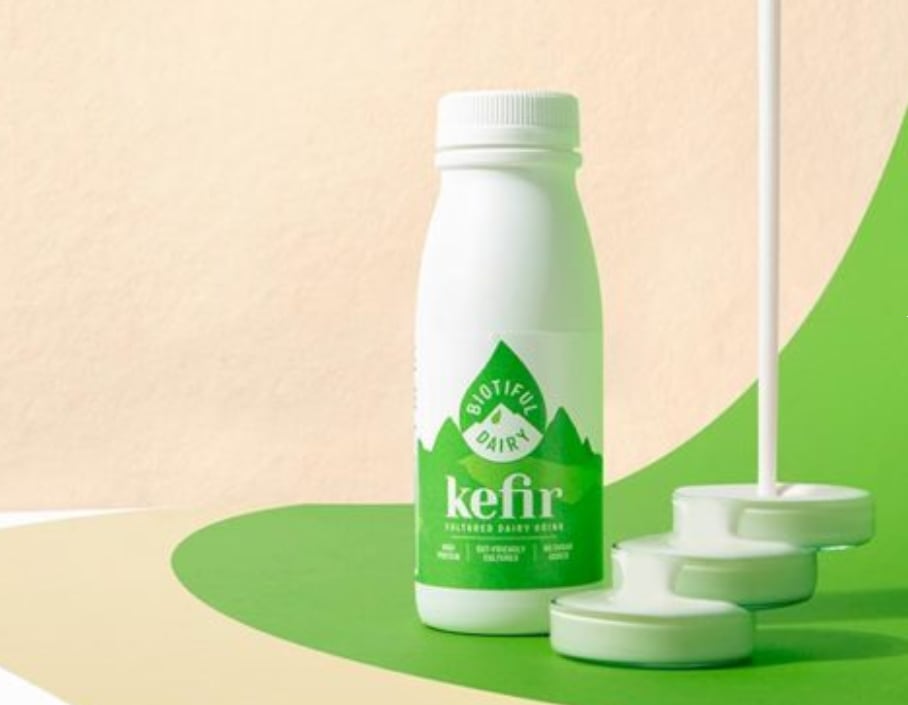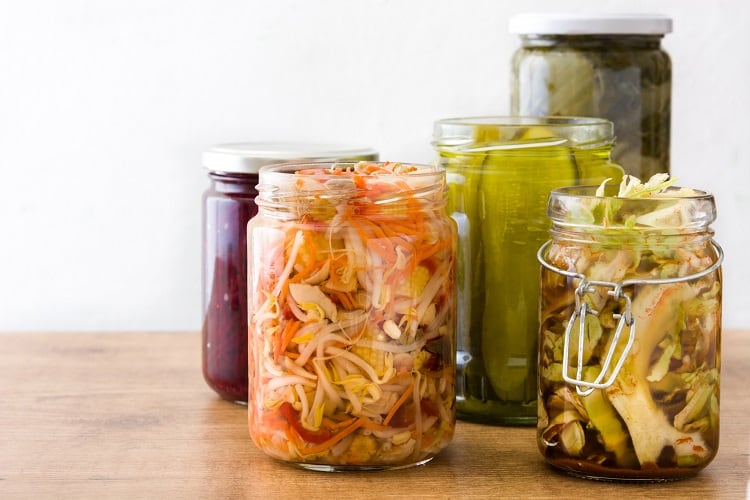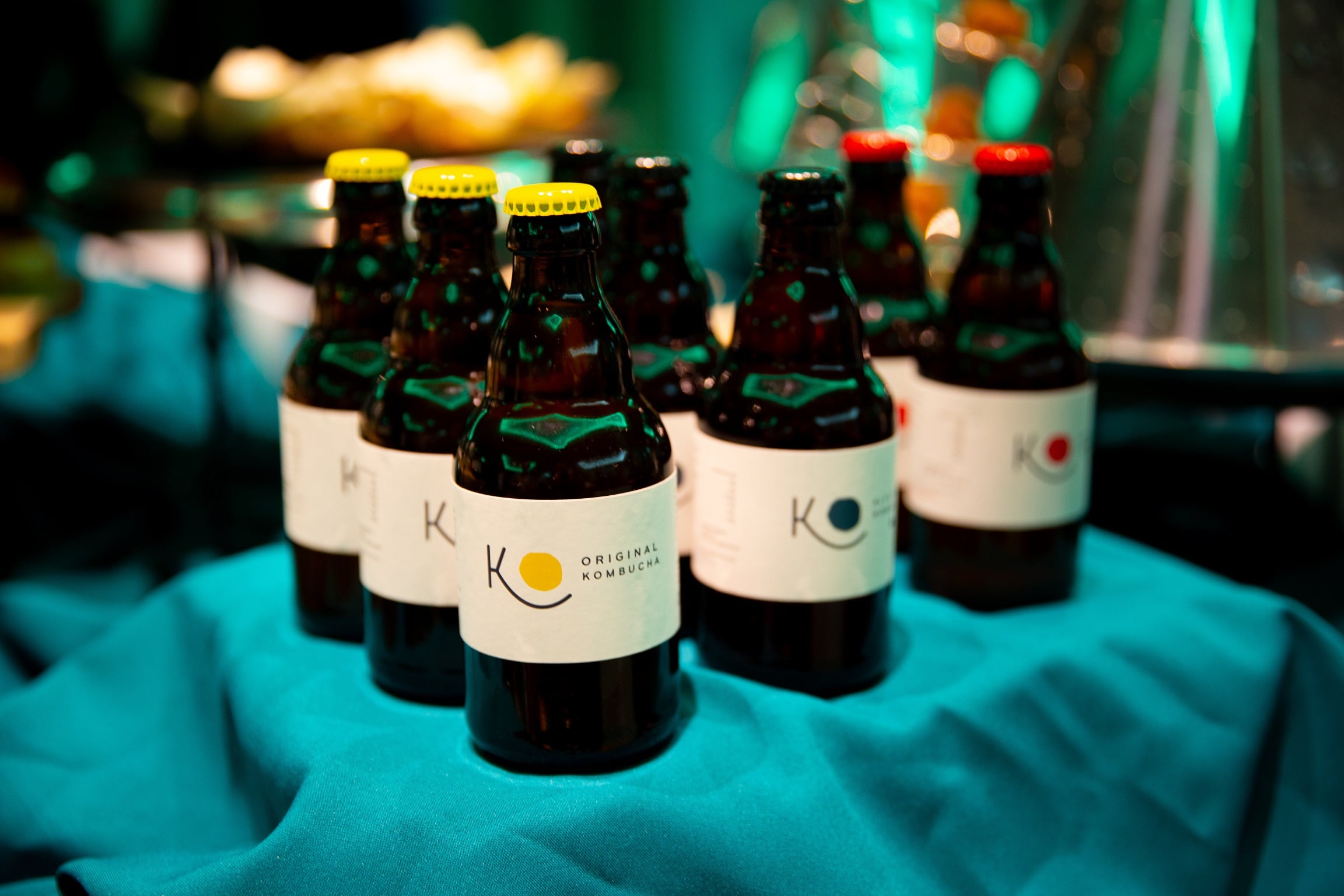Kefir has been consumed by people of the Caucasus Mountains – at the intersection of Russia, Georgia, and Azerbaijan – for over 2,000 years.
Today, the fermented dairy product is popular in Eastern Europe, Russia, Scandinavia, and in certain regions of Asia. It has also infiltrated the Northern American market.
However in the UK, where Russian-born Natasha Bowes now calls home, the dairy industry has been slow to leverage kefir’s potential. “The prospect for growth was remarkable,” she said of her first impressions of the sector.
In 2012, Bowes responded to this gap in the market with the launch of Biotiful Dairy. Over the last eight years, the business has ‘created the kefir category in mainstream dairy’, and the founder told us she continues to see potential for growth.
Biotiful beginnings
Back in Russia, Bowes had been figure skating since the age of five. It was while skating competitively that ‘nutrition and health became a healthy part of my life’, she recalled.
Upon moving to London over 20 years ago, Bowes missed the wealth of functional dairy offerings on hand in Moscow. The incentive to ‘do something about it’ came with the birth of her daughter.
“I looked at the back of the growing milk [available] and was mortified by the ingredients – the type of ingredients, the quality, and the quantity. I was unable to find enough natural, clean, healthy products with no added sugar for myself and for my daughter.”
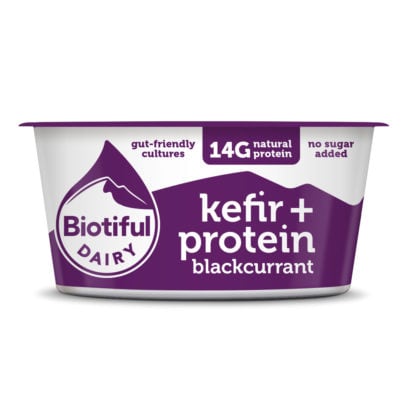
For Bowes, kefir was the answer. Kefir is a cultured, fermented beverage product made using starter grains. These are ‘essentially a cluster of beneficial bacteria’, Biotiful Dairy’s founder explained. These live cultures are added to fresh, warm milk, to kick-start the fermentation process.
The milk and cultures are sealed in a container and kept away from light. The lactose in the milk nourishes the grains, which allows them to grow and reproduce, while simultaneously starving the grains of oxygen. Once the kefir is fermented, the remaining grains are strained, leaving a similar consistency and taste to a yoghurt drink.
Bowes brought in kefir grains from Russia and set up pilot production herself, initially offering tastings in retail stores to introduce UK consumers to the kefir product. Shoppers’ reactions were positive from the get-go, she told this publication. “We’ve never had to reformulate the product.”
Kefir for gut health
Biotiful Dairy has observed growing consumer interest in kefir products over the last few years. While taste remains king – and Biotiful Dairy prides itself on ensuring consumers ‘don’t have to compromise on taste’ – kefir’s nutritional benefits are also driving demand for the category.
Fermented foods made with live cultures – such as kefir, kimchi, and sauerkraut – are reported to impart live microorganisms ‘crucial’ to healthy digestion. Biotiful Dairy’s kefir contains over 40 strains of gut-friendly cultures, and every serving contains billions of them.
Kefir is ‘as light and natural as dairy gets’, said Bowes. During the fermentation process, the kefir cultures break down the milk’s lactose sugars, which makes the final product ‘very low’ in lactose.
The process also enables consumers to ‘properly digest’ the minerals found in milk. “The bacteria break up the molecules and release the amino acids that help us to thrive as humans,” said the founder.
Further, the cultures create ‘a whole array’ of essential vitamins, including A, K, B complex, and B – all in different doses. “We don’t fortify the products,” Bowes stressed.
A growing brand
When Biotiful Dairy first launched, the brand targeted premium retailers, including high-end London chain Selfridges. The entire range was made from organic British milk, which was reflected in its price tag.
However, as the business has developed, Biotiful has become increasingly focused on reaching the masses. “Kefir is for everybody,” said Bowes, adding that the company wants to make kefir ‘as accessible as possible’.
Having gained economy of scale, and swapped out British organic milk for British conventional milk (although organic varieties are still sold in independents), today Biotiful Dairy is more accessible. Its products are sold in mainstream supermarkets across the country, including in Sainsbury’s, Asda, Tesco, and Morrisons.
The business has also expanded its range beyond its original kefir cultured dairy drink. Flavoured varieties include kefir cacao, kefir honey & ginger, kefir strawberry, and kefir mango.
The kefir protein range targets the dairy snack market, as do kids kefir slurpy varieties and the kids kefir protein squeezy offering. More recently, Biotiful Dairy has brought out cultured soft cheeses and kefir frozen desserts – available in chocolate, vanilla, and cherry – which
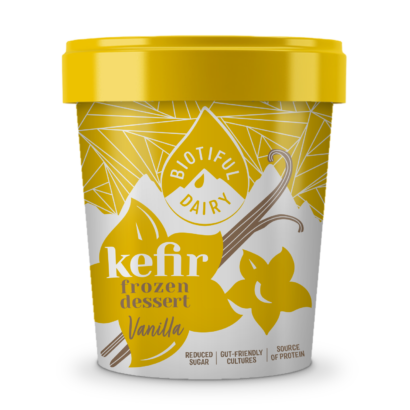
marks the brand’s foray into the ice-cream category.
None of Biotiful Dairy’s products contain artificial ingredients or added sugar, rather they are sweetened by fruit or a corresponding stabilising food aid. It is for this reason that Bowes believes the frozen dessert line is ‘probably the healthiest ice cream product you can find’.
Kefir’s digestive health attributes, she assured us, are also relevant when frozen. “When bacteria are frozen, it just goes to sleep. When you consume chilled or frozen kefir products, and the product warms up inside us, this is when they wake up and start their work. We are not compromising on the probiotic potency of the product.”
The future of kefir
Biotiful Dairy is currently selling in the UK and the Middle East, where it largely hits the expat market. The business is also ‘making first steps’ into Western Europe.
There is a growing category of shoppers, however, that Biotiful Dairy won’t be accessing. Consumers are increasingly opting for plant-based dairy alternatives in shopping aisles, which a recent report from Innova Market Insights puts down to growing interest in flexitarian diets.
When asked about reaching this market, Bowes explained that dairy-free kefir is possible. There are a couple of niche products on the market, she elaborated. “It is water-based kefir, and there is a coconut-based product out there.”
Is dairy-free kefir of interest to Biotiful Dairy? “Yes, of course it is of interest,” Bowes revealed. “Is it relevant? Yes, of course it is relevant. For a period of time it certainly felt like it would be a niche within a niche, but now that we are making kefir explode as a category, it is becoming more relevant.”
First and foremost, however, the company’s mission is to make a positive contribution to the dairy category, by making products healthier, tastier, and better quality for all. “That doesn’t get unnoticed by the bigger dairy suppliers and what we’re seeing is…their NPD pipelines are changing in quality and healthiness.”
Moving forward, Bowes predicts interest in gut health will continue to grow, and with it, the kefir category. The coronavirus pandemic has a part to play in this, we were told.
“We have noticed during COVID that we have actually grown as a brand, due to the fact that…gut health drives immunity naturally. It has only become more relevant to the consumer.”


